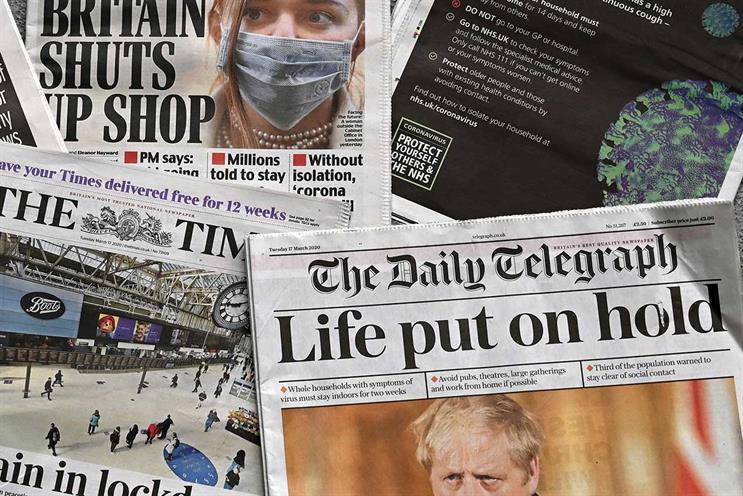
News brands are strongly urging advertisers to "back, not block" British journalism amid the Covid-19 crisis.
They are calling on brands to drop blacklists for the term "coronavirus" and those similar to it so that newspapers and their journalists can continue their work.
Since the virus outbreak began, many titles have reported a surge in online traffic. According to Newsworks, the marketing body for the news industry, several newsrooms have seen page views up by 50% and more than 70% increase in unique visitors on virus-related stories, information and content.
Newsworks added that about one-third of readers at one title are spending up to three minutes looking at articles. Video content is also proving popular, with one national publication's virus-related content receiving more than 23 million views in March.
These increases, though, are not being supported by advertisers, many of which have set up blacklists for certain words so that their advertising does not appear across stories containing such terms.
Tracy De Groose, executive chair of Newsworks, called the blacklists "harsh tools" that are designed to tackle the open web and shouldn’t be used in an environment where there are regulations and editors checking copy before it’s published.
"Our industry message to advertisers is incredibly simple: back, don’t block, British journalism," she said. "Readers are relying on us right now and we are relying on advertisers to help fund a sustainable path for British journalism."
De Groose called on brands and agencies to work directly with publishers – something that will allow them more control on where their ads are placed. "If you go to intermediaries, you just get a wide impression range," she explained.
Guardian News & Media commercial director Nick Hewat called politics a "benign" area to which blacklists have extended and that blacklists are costing news brands millions of pounds.
He explained that blacklists started becoming longer after The Times revealed that brands' ads were inadvertently running against content such as terrorism videos on YouTube.
"Interestingly for an industry that claims to work on evidence, there is no evidence that advertising sitting alongside ‘hard news’ has any negative impact on the brand itself," Hewat said.
"However, advertisers didn't want to take the risk that this could be an interpretation of their placement, so they used technology companies to block it. But even if this was a real concern, the coronavirus is different. I haven't met anyone who is pro-virus."
Hewat added that some brands that are blocking the term for news brands continue to run campaigns on radio and social media, where there is also talk on the virus. "This is the world’s story," he added.
"Brand safety has always been a contentious issue for publishers and it has cost us millions. We are responsible; we routinely take down ads on content about natural disasters or terrorist attacks," Hewat continued.
"Publishers also believe that they are the only ones who are punished, in an advertising sense, for reporting and distributing the news that society desperately needs. The system needs an overhaul; the technology needs improving."
News UK and the Daily Mail echoed these views, saying that newspapers provide a vital service for the nation in getting facts on the virus out in a safe environment.
"We also provide a unique vehicle to allow the government and other advertisers to get their vital messages out to the country," News UK chief operating officer David Dinsmore said. "Clearly, this is not possible on the ad-free BBC, while in the frenzied world of social media advertisers have no idea if their message will appear alongside myth or fact."
Daily Mail editor Geordie Greig added that the newspaper has a team of medical and financial experts "who are giving readers critical advice to help guide them through this unsettling time".




.jpg)
.jpeg)
